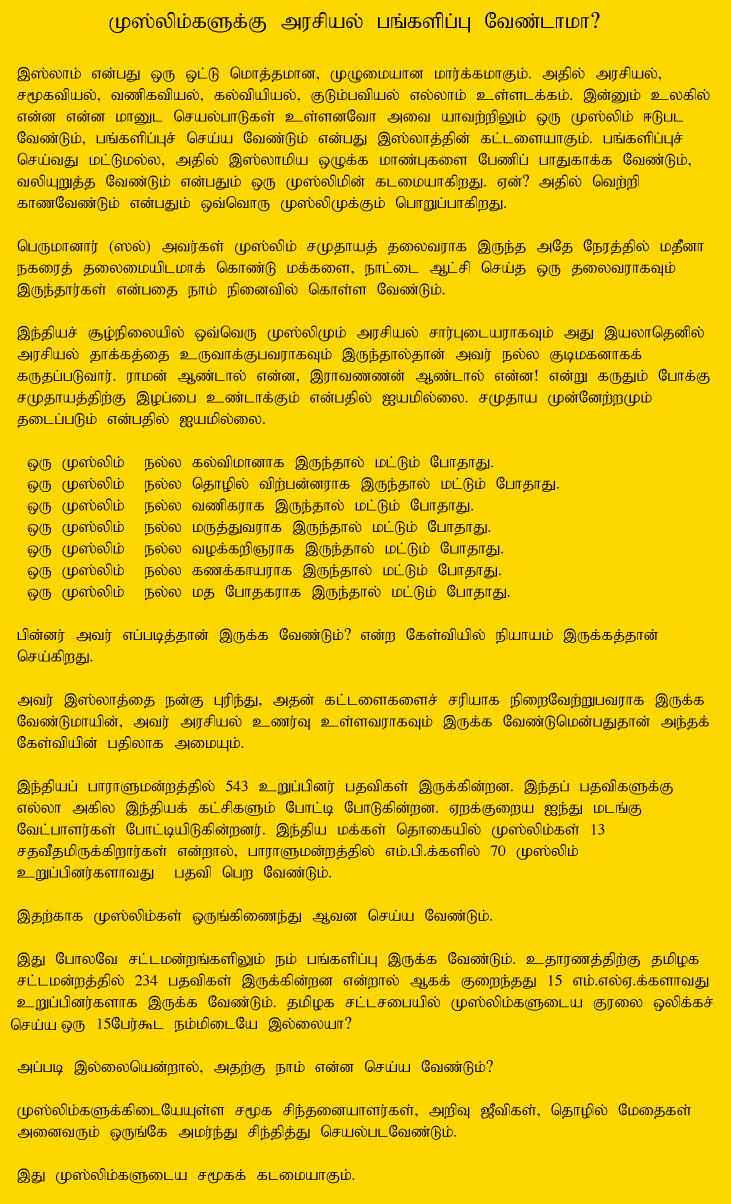
| O you who believe! Be upright for Allah, bearers of witness with justice, and let not hatred of a people incite you not to act equitably; act equitably, that is nearer to piety, and he careful of (your duty to) Allah; surely Allah is Aware of what you do.[Holy Quran 5:8] |

Don't Muslims Require Political Participation?

The Hindu Editorial
What separates affirmative action from discrimination is, sometimes, no more than a thin line. While Clause (1) of Article 15 of the Constitution of India bars discrimination "against any citizen on grounds only of religion," Clause (4) specifically allows the State to make "any special provision for the advancement of any socially and educationally backward classes."
Large sections of Muslims are no doubt socially and educationally backward, and need the constitutionally-enabled special provision for reservation in education and employment. However, the challenge is to identify these backward sections by adopting a system that does not amount to extending the reservation benefits solely on the ground of religion, which is barred under the Constitution. In the case of the majority Hindu community, socially and economically backward castes, subject to some regional variations, have been identified for reservation benefits as socially and economically backward classes.
The absence of an easily identifiable and permanent label akin to caste complicates matters for religious minorities. But social classes and vocational groups among the minorities whose counterparts in the majority community are regarded as backward should have access to the same reservation benefits. However, without a proper assessment of the social and educational conditions of different sections of Muslims, any adhoc provision made by the State governments will be open to legal challenges.
In Andhra Pradesh, a four per cent reservation for selected sections of Muslims was made through the Andhra Pradesh Reservation in Favour of Socially and Educationally Backward Classes of Muslims Act, 2007, on the basis of the report of the A.P. Commission for Backward Classes. However, the Andhra Pradesh High Court found the Act "religion-specific" and the report of the Commission procedurally flawed. However, just as reservation benefits cannot be granted on grounds only of religion, they cannot also be held back on grounds of religion.
The Scheduled Castes, who have suffered oppression in Hindu society, and the Scheduled Tribes, who have remained outside the social mainstream, fall under a different category of reservations, and the issue of extending the SC status to converts to other religions remains unresolved. However, there is no reason why affirmative action and reservations granted to the backward classes among the Hindus should not be extended to similarly placed sections among Muslims and other religious minorities. Instead of resorting to hasty measures that may not stand judicial scrutiny, the Centre and the States must formulate a comprehensive reservation scheme for the socially and educationally backward classes belonging to all religions including Islam, taking into consideration the recommendations of the
Ranganath Mishra Commission.
Courtesy: UEF Monthly Bulletin - March 2007



